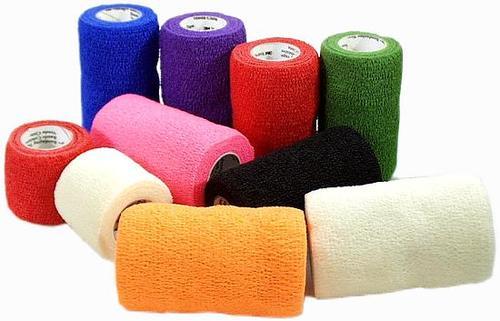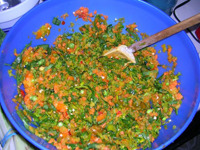So what's a special needs bird, anyway?
 |
| Vet Wrap is great, because when it gets dirty, it is easy to replace. |
While some accommodation is necessary, these birds live happy, healthy productive lives. Here are some of the types of special needs birds we have cared for at Squawk and Howl (in rescue, cage remodeling services, and in pet sitting)
1. birds with feet or legs missing/paralyzed.
Birds of this type need accommodations such as ladders to climb and perch upon (hang them horizontally as a type of wide perch), platforms to rest upon, and huts and hammocks to sleep in. These birds tend to prefer rope perches to harder wood ones. “Vet wrap” is always a great gripper to wrap around cage furnishings and perching areas for these birds.
2. birds with no or only partial beaks.
In addition to having some mobility issues (birds use their beaks as a third foot to climb, for example), these birds may have some eating issues, too. They cannot mascerate their food the way a beaked hookbill can, so small, pulverized, and/or mushy foods are key to helping these birds. To make foods that are made especially for beakless birds, you can use a food processor and add moisture to pellets, seed and sprout mixes and veggies to make a thick paste or slurry, depending on your bird’s preference. Momma Bird's Birdie Bread can be mushed up with vegetable or chicken broth into a slurry or paste, and still tastes just as great!
 |
| Here is a blend of highly chopped mash- all organic fresh veggies, using a food processor. |
Birds that cannot hear or see can be easily startled, and for a prey animal, that’s scary business. They need a slow, calm person to live with, as sudden movements seem to startle them more. Deaf birds can easily be accommodated with a visual signal that you will be entering the room, much like a doorbell or phone “ringer” in a deaf person’s home.
4. birds that have emotional issues from serious neglect or abuse.
Oftentimes, the invisible “disabilities” are the hardest to accommodate. They look “normal” but many birds that were rescued from bad situations (not just simple re-homed birds dealing with grief, but actual rescues that are survivors) have “baggage” that you need to compassionately discover and learn how to work around. These birds have legitimate fears (that sometimes translate into aggression or phobic behaviors) that need to be respected. And in my case, I personally had a bird Angus who was in “solitary confinement” with NO social interaction for 21 years before he came to live with me. My advice? Go slow, on the bird’s time-line--not yours. Celebrate the victories, no matter how small. And learn what these birds will teach you.
5. blind birds.
Just like with humans, blind birds need accommodations that don’t change very often. A basic cage layout, food & water always in the same place, etc. Toys can be rotated, but they should stay in the same areas that toys go in that cage. And toys that spin or move don’t work for this group. A minimal cage layout is best for blind birds, and yes! they can be housed with others. Often the birds will cooperate & help one another. Foot toys and shreddables work just great for birds who are blind.
6. pluckers and self-mutilators
Pluckers and self-mutilators do it for so many reasons, and medical testing is necessary to eliminate physical causes before assuming that the issue is behavioral. I will post further about plucking for more info on that. And just because a bird plucks or mutilates does not mean that they are unhappy, in a bad home, or being abused or neglected. Some of the most caring and wonderful bird parents out there have pluckers and mutilators. That said, living with a plucker is much easier than living with a self-mutilator (a bird who inflicts wounds to their flesh). Mutilators are often hospitalized, collared, and given lupron injections to deal with the problem. It can be costly and is certainly a commitment.
As always, be sure to check out Momma Bird's Cafe and Toy Shoppe for the very best toys that aim at redirecting a lot of this unwanted behavior, like shreddable and foraging toys!
Now through Sept 2nd, enter code specialneeds to get free shipping on orders over $100!


No comments:
Post a Comment